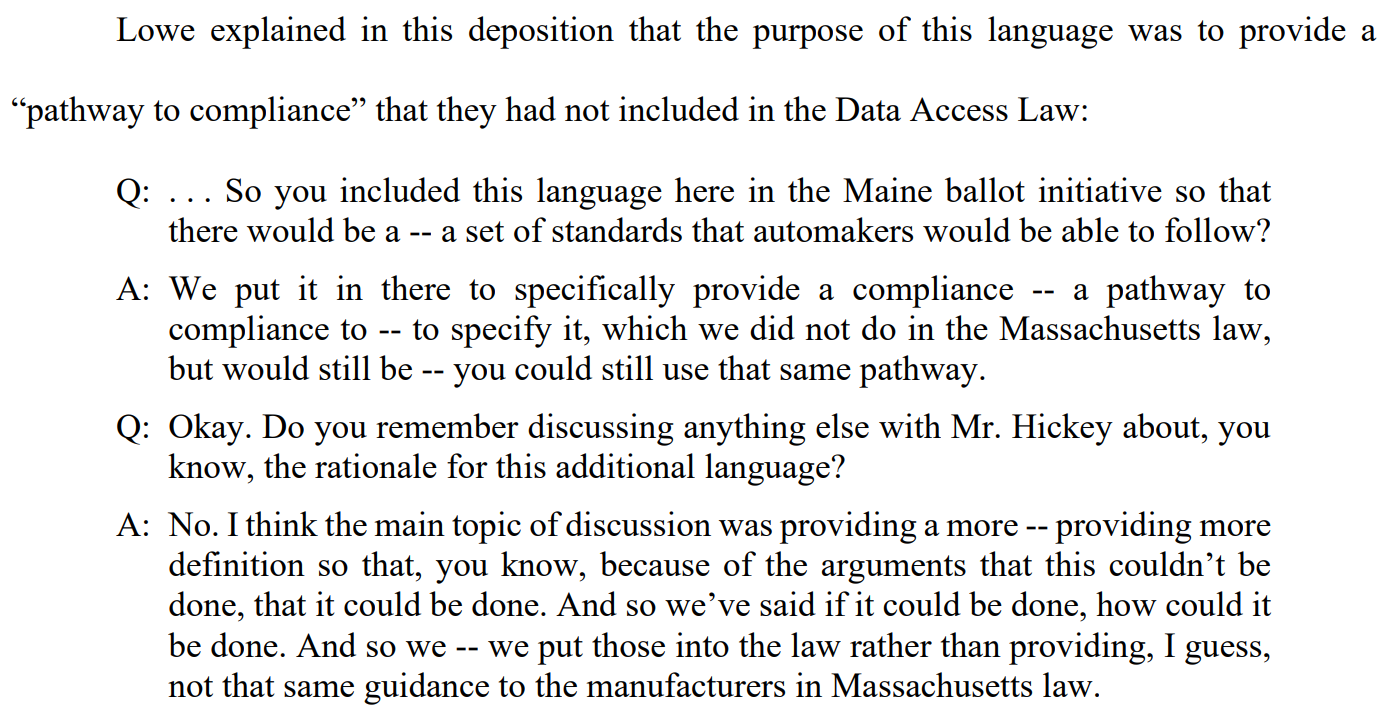
AAI: Auto Care Association’s hand in Maine ‘right to repair’ bill proves OEMs can’t comply with Mass. data law
By onLegal
The Alliance for Automotive Innovation (AAI) has filed a brief covering how testimony from Aaron Lowe, on behalf of Auto Care Association (ACA), backs up their argument that ACA “stands at the center” of its lawsuit against Massachusetts over its vehicle data access law, and could prove that OEMs can’t safely and consistently comply with the legislation.
In March, newly elected Massachusetts Attorney General Andrea Campbell terminated a non-enforcement stipulation of the Data Access Law agreed to by former AG Maura Healey that had been in place since Dec. 3, 2020. If approved by a federal district judge, that means the law will be enforced by Campbell beginning June 1.
In November 2022, AAI asked U.S. District Court Judge Douglas Woodlock to reopen evidence in the case, AAI v. Maura Healey, after a similar ACA-backed data access initiative was put forward in Maine. Significant differences between the law approved by Massachusetts voters in November 2020 — an expansion of the state’s earlier right to repair law — and the new Maine initiative submitted in August, both promoted by ACA, show those who drafted the Maine legislation recognized that the Massachusetts legislation is flawed, AAI argued.
In February, Maine Secretary of State Shenna Bellows approved the Maine Right to Repair Coalition’s petition for the creation of a “standardized access platform” for data generated, collected, and transmitted by vehicles to be a referendum on November’s ballot.
The coalition filed an application for a citizens initiative, known as the “Automotive Right to Repair,” and a draft of proposed legislation with the Secretary of State’s Office in August 2022. Bellows approved the petition in October. Auto repair and parts store operators had 18 months from that time to collect signatures, which had to add up to 10% of the total votes cast in the 2022 gubernatorial election. The petition was signed 74,686 times — nearly 7,000 more than needed.
Woodlock ordered AAI to file the brief on Lowe’s testimony and ordered Campbell to submit a brief in response to AAI’s.AAI contends in its April 7 brief that “the Maine ballot initiative is the product of the same individuals with the same gameplan,” including ACA’s Aaron Lowe, Brian Hickey & Associates employee and Massachusetts Right to Repair Committee Director Tommy Hickey, BHA founder Brian Hickey, and Coalition for Auto Repair Equality President Ray Pohlman.
“The changes that the Data Access Law’s drafters made in the Maine ballot initiative underscore several features of the Data Access Law that make compliance impossible, and the ACA has done nothing to facilitate that compliance since the 2021 trial in this action,” AAI wrote in the brief. “Auto Innovators respectfully requests that the Court consider these facts when rendering its judgment deciding whether to award any future equitable relief.
“…Though the Maine question remains extremely problematic, its drafters made several significant revisions — and those revisions underscore that it is impossible to comply with the Data Access Law without compromising vehicles’ safety and emissions systems, in violation of federal law.”
The brief goes on to argue that OEMs can’t comply with the Data Access Law, as backed up in the Maine initiative and by Lowe in his deposition, because the companies wouldn’t be able to create and fund a third-party entity to administer “a standardized authorization system for access to vehicle networks and their on-board diagnostic systems” without violating the law’s prohibition on their direct involvement.
Lowe’s addition of the following language to Maine’s proposed legislation that was omitted from Massachusetts’ law proves “OEMs do not have any means or ability to create such an ‘independent entity’ on their own,” according to AAI:
“The Maine attorney general shall designate an independent entity not controlled by one or more of the motor vehicle manufacturers to establish and administer access to vehicle generated data available through the on-board diagnostic system and/or which is transmitted by the standardized access platform authorized by this law.
“Such independent entity shall consist of one representative from a cross section of each industry trade group… The independent entity shall manage cyber secure access to vehicle generated data, including ensuring on an ongoing basis that access to the on-board diagnostic system and platform is secure based on all applicable U.S. and international standards.”
The brief further contends that language Lowe added in the proposed Maine legislation proves there aren’t already standards across makes and models:
AAI then concludes that, in addition to cybersecurity risks that would come with standardization, “Lowe’s acknowledgment that ACA wanted to create a ‘pathway to compliance’ in the Maine ballot initiative — in contrast to the Data Access Law, which did not provide any guidance, much less ‘th[e] same guidance to the manufacturers…’ — underscores OEMs’ inability to safely comply with the Data Access Law.”
Lastly, AAI says ACA has done nothing since the trial in 2021 to make compliance with the Data Access Law possible.
Images
Featured image credit: solidcolours/iStock

